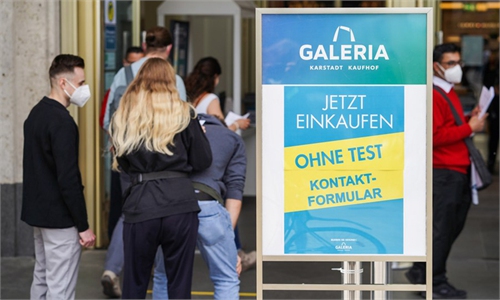
People are seen at a beer garden in Berlin, Germany, June 5, 2021. Germany will lift its vaccination prioritization scheme on June 7, making all citizens older than 12 years eligible to receive a COVID-19 vaccination, Minister of Health Jens Spahn announced on June 2. (Photo by Stefan Zeitz/Xinhua)
Germany announced record coronavirus fatalities and infections Thursday as its total death toll passed 100,000, with its most severe virus wave yet breaking just as a new government prepares to take the reins.Germany weathered earlier bouts of the pandemic better than many other European countries, but has seen a recent resurgence, with intensive care beds rapidly filling up.
Europe's largest economy recorded 351 fatalities in the past 24 hours, bringing the total death toll since the start of the pandemic to 100,119, according to figures from the Robert Koch Institute, a public health agency.
The weekly incidence rate also hit an all-time high of 419.7 new infections per 100,000 people, RKI announced.
The escalating health crisis poses an immediate challenge to the new coalition government set to take over from Angela Merkel's cabinet in December.
The spike in Germany comes as Europe has reemerged as the pandemic's epicenter, with the continent battling sluggish vaccine uptake in some nations, the highly contagious Delta variant, colder weather moving people indoors and the easing of restrictions.
Last week, more than 2.5 million cases and almost 30,000 COVID-19-related deaths were recorded in Europe, making it by far the region currently worst hit by the virus.
In a sign of the severity of the virus wave hitting Germany, its health sector has had to call on hospitals elsewhere in the EU for help.
Some hospitals are already facing an "acute overload" that has made it necessary to transfer COVID-19 patients abroad, according to Gernot Marx, head of the German Interdisciplinary Association for Intensive Care and Emergency Medicine.
AFP



